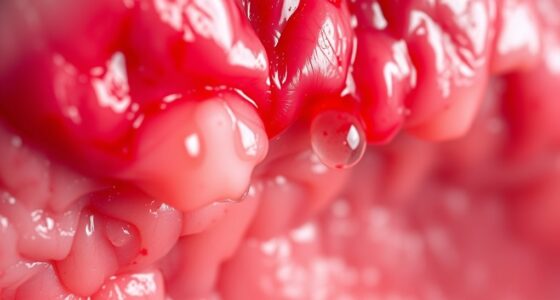Brushing with cold water can offer benefits like helping to preserve your enamel, boosting saliva production, and making your brushing feel more invigorating. It may also help reduce gum irritation for some people. However, if you’re sensitive to cold or have gum issues, it might cause discomfort or irritation. Whether hot or cold, your brushing technique matters most. To discover more about how water temperature impacts your oral health, keep exploring the details ahead.
Key Takeaways
- Cold water helps preserve enamel and supports saliva production, enhancing natural oral defenses.
- It can invigorate brushing, encouraging proper technique and making the experience more refreshing.
- Cold water may cause discomfort or gum irritation for sensitive individuals, affecting routine consistency.
- Warm water is often preferred for comfort, especially for those with sensitive teeth or gum issues.
- Personal preference and cultural practices influence whether cold or warm water is better for individual oral hygiene.
The Science Behind Water Temperature and Oral Hygiene
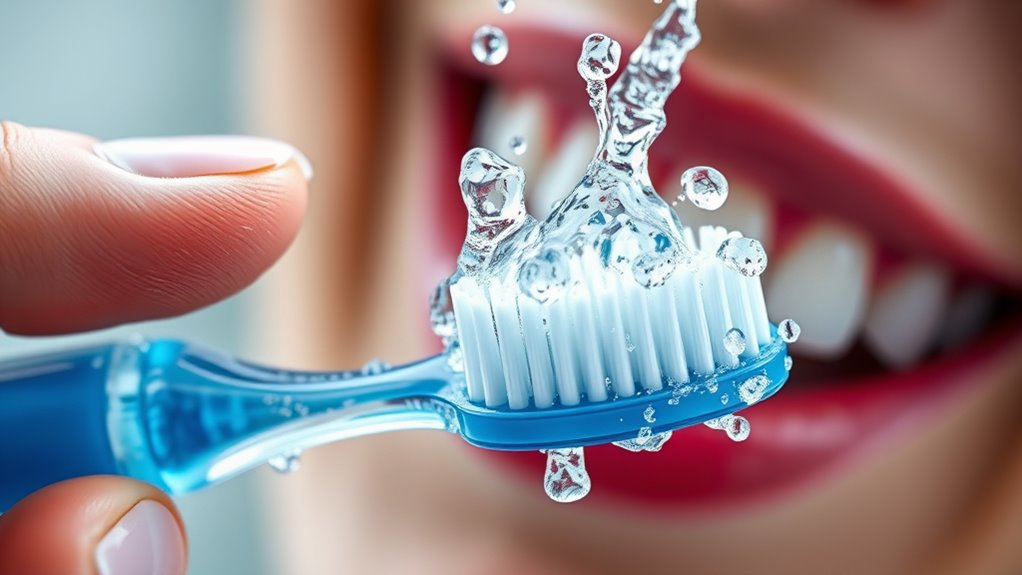
While many people assume that water temperature doesn’t substantially affect brushing, scientific studies show otherwise. Cold water can help preserve your dental enamel by minimizing potential damage caused by hot water, which can soften enamel over time. Additionally, colder water may influence saliva production, which plays a vital role in protecting your teeth. Saliva helps neutralize acids and wash away food particles, reducing the risk of cavities and erosion. When you brush with cold water, you support the natural strengthening process of your enamel and maintain ideal saliva flow. These factors combined make cold water a beneficial choice for maintaining oral health, especially regarding protecting your teeth’s surface and supporting your mouth’s natural defenses. Moreover, understanding the impact of water temperature on oral health can guide better daily hygiene practices.
Benefits of Using Cold Water for Brushing
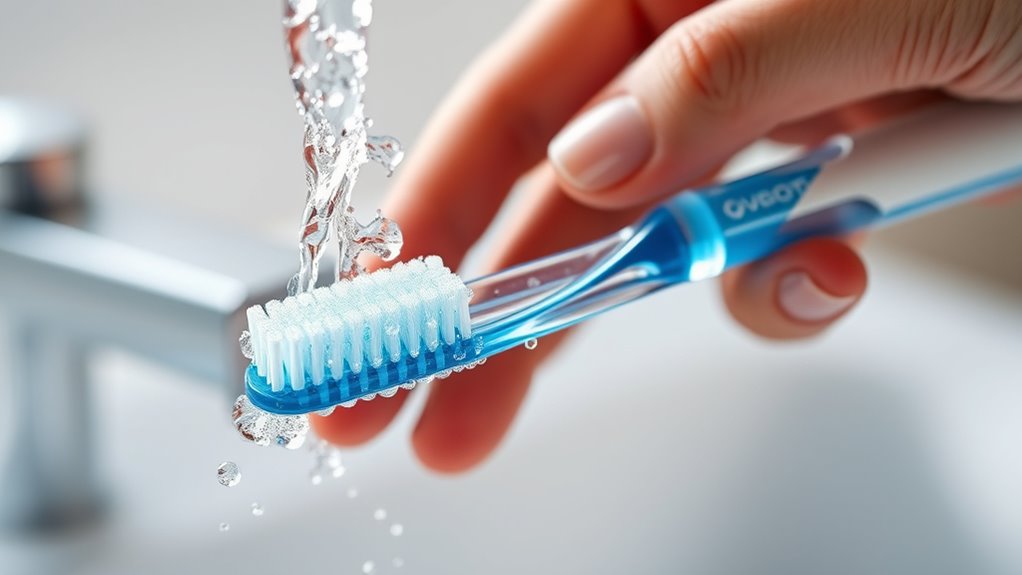
Using cold water for brushing offers several clear benefits that can enhance your oral health. Cold water helps invigorate your brushing routine, encouraging you to focus on proper brushing technique. It can also make the toothpaste flavor feel more revitalizing, boosting your motivation to brush thoroughly. Additionally, cold water may reduce gum irritation compared to warm water, making your experience more comfortable. Incorporating cold water can also help you develop a consistent brushing habit, as the invigorating sensation encourages mindfulness during your routine. Here’s a quick comparison:
| Benefit | Explanation |
|---|---|
| Refreshing flavor | Enhances toothpaste flavor, making brushing enjoyable |
| Better technique | Promotes thorough, mindful brushing |
| Reduced irritation | Gentle on gums, less sensitivity |
| Habit formation | Invigorates routine, encouraging consistency |
| Overall comfort | Makes brushing more pleasant |
Cold water’s temperature stability can help maintain a consistent brushing experience, further supporting good oral hygiene.
Potential Drawbacks of Cold Water Brushing
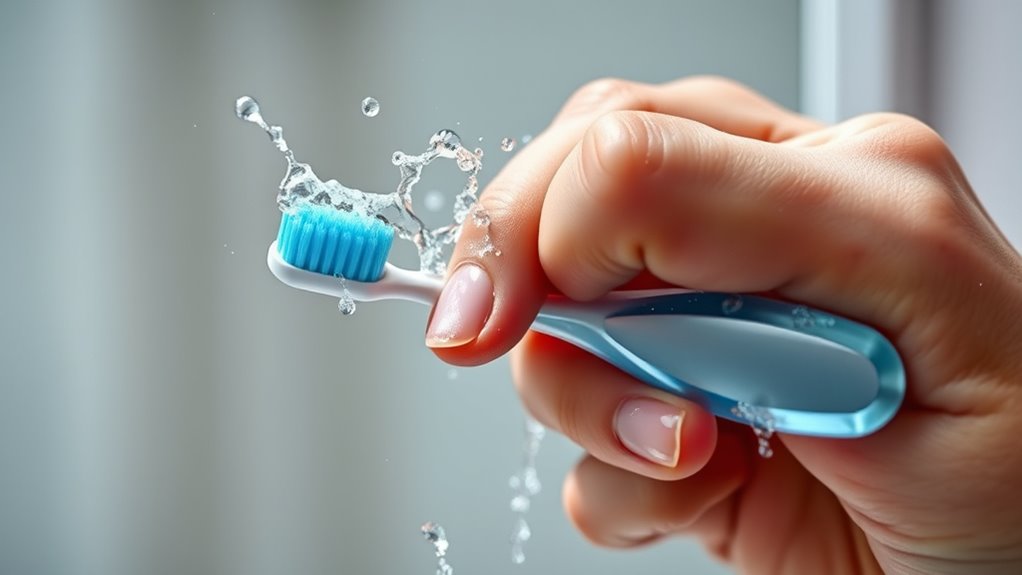
Despite the many advantages of brushing with cold water, it can also present some challenges. If you have cold sensitivity, the icy sensation might cause discomfort or even pain, making it harder to stick with your routine. Cold water can also lead to gum irritation, especially if you brush vigorously or have sensitive gums. This irritation might cause redness, soreness, or bleeding, which can discourage regular brushing. Additionally, some people find that cold water doesn’t effectively remove plaque or freshen their breath as well as warmer water. If you experience any of these issues, it may be worth considering alternative water temperatures or consulting your dentist for personalized advice. Recognizing these potential drawbacks helps you make informed choices about your oral hygiene routine.
Personal Preferences and Cultural Practices
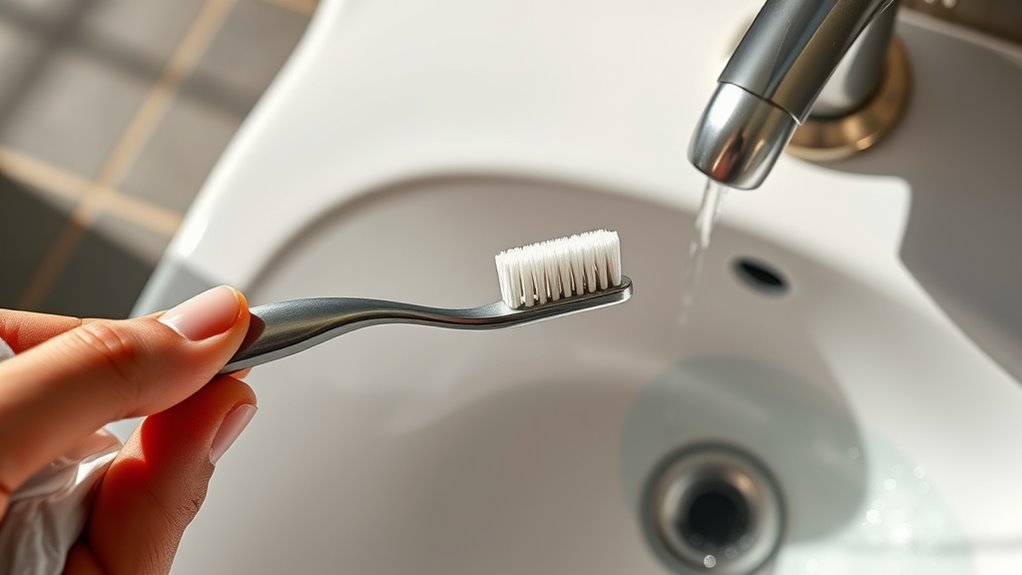
Personal preferences and cultural practices greatly influence how you choose to brush your teeth, including your water temperature. In some cultures, cold water is the norm because it’s believed to invigorate and promote invigoration, while others prefer warm water for comfort and relaxation. Your cultural habits shape your dental routine and can impact whether you feel comfortable using cold or warm water. Personal comfort plays a significant role—if cold water feels invigorating, you might prefer it even if others don’t. These choices are often deeply rooted in tradition or personal experiences. Ultimately, your cultural background and comfort level guide your preferences, making brushing a personal ritual rather than a strictly health-driven decision. Your habits reflect your cultural identity and individual comfort. Additionally, understanding the best oral hygiene practices can help ensure that your choice of water temperature does not compromise dental health.
Making an Informed Choice for Your Dental Routine
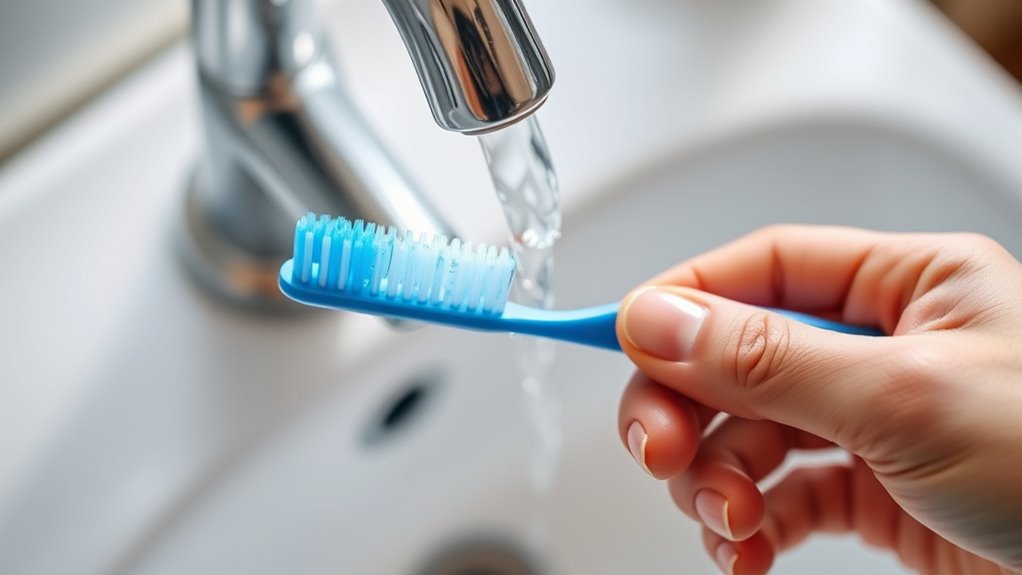
Making an informed choice about your dental routine requires understanding the potential benefits and drawbacks of different water temperatures. Consider alternative brushing techniques, such as using a soft-bristled brush or gentle circular motions, to improve cleaning without relying solely on water temperature. Your dental product preferences also matter; some toothpastes are designed for sensitive teeth, which might be more comfortable with cold water, while others work well with warm water. Think about how your teeth and gums respond to different sensations and adjust accordingly. Research shows that temperature can influence comfort, but effective brushing depends on technique, duration, and product selection. Additionally, maintaining proper air purifier maintenance and cleaning can help improve overall indoor air quality, which indirectly supports oral health by reducing airborne irritants. Ultimately, choose a routine that suits your needs, promotes oral health, and feels comfortable, whether you prefer cold, warm, or room temperature water.
Frequently Asked Questions
Can Cold Water Help Reduce Tooth Sensitivity?
Cold water can help reduce dental sensitivity because it temporarily numbs nerve endings in your teeth, offering short-term relief. When you use cold water, it may soothe sensitive areas caused by exposed dentin or enamel erosion. However, water temperature plays a role; overly cold water might trigger discomfort for some. You should experiment with slightly cooler water to see if it alleviates your dental sensitivity without causing discomfort.
Is There an Ideal Water Temperature for Children’S Dental Care?
You might wonder if there’s an ideal water temperature for children’s dental care. For age-appropriate brushing, use lukewarm water—it’s comfortable and effective for cleaning teeth without causing discomfort. Very hot or cold water can be harsh or startling, especially for young children. Keep the water at a moderate temperature to promote a positive brushing experience and guarantee thorough, gentle cleaning that suits your child’s age.
How Does Hot Water Compare to Cold Water in Plaque Removal?
Like a knight choosing armor, you wonder how hot water compares to cold in plaque removal. Temperature influence plays a key role here; hot water may soften plaque slightly, but cold water helps maintain freshness and can be just as effective. Ultimately, the temperature’s effect on plaque removal isn’t dramatic. Focus on proper brushing technique, thoroughness, and consistency—you’ll keep your teeth healthy regardless of water temperature.
Does Water Temperature Affect Fluoride Effectiveness?
You might wonder if water temperature affects fluoride effectiveness. Cooler water can enhance fluoride absorption because it maintains higher water solubility, allowing fluoride ions to better penetrate your enamel. Warmer water, on the other hand, may reduce fluoride absorption by decreasing its solubility. So, using cold or room temperature water during brushing can help maximize fluoride’s protective benefits for your teeth.
Are There Specific Dental Conditions That Benefit From Cold Water Brushing?
You might find that brushing with cold water helps certain dental conditions. Cold water can soothe sensitive teeth and reduce discomfort caused by dental plaque buildup or enamel erosion. It also limits the risk of further enamel damage, as hot water can weaken enamel over time. If you have sensitive teeth or enamel erosion, using cold water may provide relief and benefit your oral health, making brushing more comfortable and effective.
Conclusion
So, does cold water truly impact your oral health? The answer isn’t straightforward, and your choice might just influence your dental routine more than you realize. Will embracing the chill give you a surprising advantage, or is it a habit best left behind? Ultimately, the decision is yours—armed with knowledge and curiosity. But one thing’s for sure: the next time you brush, you might just want to think twice before reaching for that tap.



